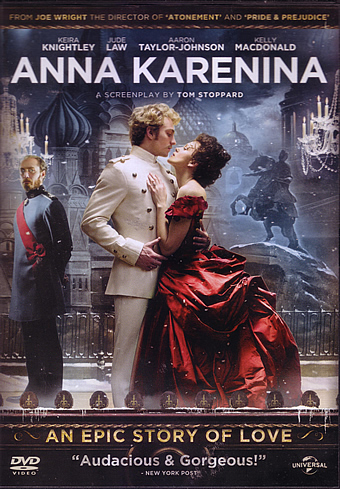ANNA KARENINA DVD (2012)
SYNOPSIS: The third collaboration of Academy Award nominee Keira Knightley with acclaimed director Joe Wright, following the award-winning box office successes Pride & Prejudice and Atonement, is a bold, theatrical new vision of the epic story of love, adapted from Leo Tolstoy's timeless novel by Academy Award winner Tom Stoppard. The story powerfully explores the capacity for love that surges through the human heart. As Anna (Ms. Knightley) questions her happiness and marriage, change comes to all around her.
MOVIE REVIEW:
The biggest challenge facing most big-screen adaptations of literary classics is this – where do you start and where do you end? Often much denser and sprawling than can be fitted into the typical length of a motion picture, such tomes end up tripping even the most sophisticated of directors, admired more for ambition than execution. Surprisingly, British director Joe Wright has managed to overcome the inherent obstacles of adapting his source materials in his last two movies – ‘Pride and Prejudice’ and ‘Atonement’ – so it is with similar expectations that we look forward to his retelling of Leo Tolstoy’s most famous novel ‘Anna Karenina’.
Though Wright had opted for substance over style in his earlier two films, he has taken a decidedly different approach this time round, so much so that his latest is an exercise of style over substance. Not that it is a bad thing in itself, but it does mean that the storytelling is somewhat lacking – despite a script by renowned playwright cum screenwriter Tom Stoppard, he who was also behind the Academy-Award winning ‘Shakespeare in Love’. Indeed, a rudimentary knowledge of Tolstoy’s book is probably best if you want to fully appreciate this adaptation; otherwise, you might be left scratching your head why the characters behave as foolishly as they do.
So for the uninitiated, the gist goes like this – a prominent Russian socialite and wife to Imperial minister Karenin (Jude Law), Anna as played by Keira Knightley starts off the story journeying to Moscow to convince her sister-in-law Dolly (Kelly MacDonald) to forgive her brother Stiva’s (Matthew Macfadyen) marital indiscretions. Nonetheless, Anna ends up falling in love with a caddish cavalry officer Prince Vronsky (Aaron Taylor-Johnson), their affair quickly becoming the much-talked about scandal in Russian society. A significant bit ensues – too much, in our opinion – to the extent that it feels as if both Wright and Stoppard were trying too hard to give due justice to every single twist of Anna’s fate in the book.
Rather than build our sympathies towards Anna, the twisty events only turn more and more caricatured, with the same to be said of the titular character. Trapped by her yearning for true love and hemmed in by the prevailing societal norms which equate her pursuit of true love as no more than adultery, Anna’s initial confidence and poise gives way slowly to her jealous rages and anxious insecurity – but instead of feeling pity for her, we are instead prone to chastise what appears to be a petulant and self-absorbed character who cares little except for her own selfish desires. Too much plotting ruins how we are supposed to react towards Anna, which is ultimately to the detriment of the story.
And that is despite the fact that Keira Knightley’s performance is rather impressive, imbuing her character with dignity and grace before managing a convincing transformation into romantic anguish and eventually obsessiveness. On the other hand, her romantic other half, Aaron Taylor-Johnson lacks the gravitas to make us root for his character, coming off instead as a philandering lover who can’t quite be bothered about the consequences of his actions even on those he loves. Instead, one ends up rooting for Jude Law’s Karenin, who through his woundedness upon discovering her affair and subsequent gracious gesture that can only be borne out of true love, makes it even more difficult to empathise with Anna.
The unevenness of the production is perhaps most apparent in Wright’s staging, which combines a mixture of backstage spaces, theatre sets, film settings and lastly outdoor locations. Switching among the various artifices rather unpredictably, Wright ensures that there is always visual dazzle in the production, though the effect is disorienting at times and too ostentatious for a novel that was never meant to be that showy. What it does succeed is in getting to think about the adage about life being a stage in itself, which nonetheless works against the film in getting us to buy into the chain of events.
Perhaps then instead of aiming for a more ambitious style, Wright could have placed more emphasis on the substance of the film, or rather, the substance of Tolstoy’s novel. The same could also be said of Stoppard, this adaptation nowhere near any of his best works. So yet again, this is one literary adaptation that stumbles under the weight of its source novel – certainly, one cannot fault Wright for trying something different than his earlier two films, but as we said earlier, ambition itself is not often good enough in execution.
AUDIO/VISUAL:
The Dolby Digital 5.1 audio package is a pretty neat one, packing in the surround where possible to deliver an immersive experience, though largely this dialogue-heavy movie relies on the crispness of the delivery of your front and centre speakers. Visuals are equally sharp and immaculate.
MOVIE RATING:



DVD RATING :


Review by Gabriel Chong

